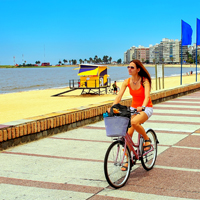Retire in Maldonado Guide
Summary: If Maldonado is on your retirement radar, our detailed Retire in Maldonado Guide is your go-to resource. Delve into the crucial aspects of life here, including living costs, climate, housing options, healthcare services, and residency procedures. We also explore the city's social dynamics, volunteering scenes, transportation, and how walkable its neighborhoods are.
Maldonado is a hidden gem that has been attracting international retirees for years. With its beautiful beaches, relaxed lifestyle, and affordable cost of living, it's no wonder why so many people choose to spend their golden years here. However, like any place, retiring in Maldonado comes with its own set of challenges. From learning a new language to navigating the healthcare system, there's a lot to consider before making the move.
Cost of Living
One of the biggest draws to Maldonado is its affordable cost of living. While it's not the cheapest place in South America, it's significantly less expensive than many popular retirement destinations in North America and Europe. Housing, groceries, and healthcare are all reasonably priced, making it possible to live comfortably on a modest retirement income.
Climate
Maldonado boasts a temperate climate with warm summers and mild winters. The city enjoys plenty of sunshine throughout the year, making it an ideal place for outdoor activities. However, it's worth noting that the weather can be quite changeable, with occasional bouts of heavy rain and strong winds.
Healthcare
Uruguay has a high standard of healthcare, and Maldonado is no exception. The city is home to several well-equipped hospitals and clinics, and there are plenty of good doctors to choose from. However, it's worth noting that while healthcare is generally affordable, it can be more expensive for those without residency status.
Public Healthcare System
Uruguay's public healthcare system is open to all residents, including international retirees. However, many retirees choose to use private healthcare services, which are generally faster and more efficient. It's also worth noting that while public healthcare is free, there can be long wait times for non-emergency procedures.
Residency Options for Retirees
Uruguay offers several residency options for retirees, including a retiree visa that allows you to live in the country indefinitely. The process of obtaining residency can be complex and time-consuming, so it's worth seeking professional advice before you start.
Parks and Recreational Activities
Maldonado is home to a number of beautiful parks and recreational areas, including the stunning Playa Mansa and Playa Brava. The city also offers a range of activities for retirees, from golf and tennis to fishing and sailing.
Restaurants
Food lovers will be spoilt for choice in Maldonado, with a wide range of restaurants offering everything from traditional Uruguayan cuisine to international dishes. Some popular spots include La Pasiva for its famous chivitos, and Cantina del Vigia for its delicious seafood.
Learning the Language
While many people in Maldonado speak English, it's definitely beneficial to learn some Spanish. There are several language schools in the city, including the Instituto de Español, which offers intensive courses for beginners.
Local Culture
The locals in Maldonado are generally friendly and welcoming to foreigners. The city has a relaxed, laid-back vibe that many retirees find appealing. However, it's worth noting that the pace of life can be slow, which can take some getting used to for those used to a faster pace.
Meeting People and Volunteering
Meeting new people can be a challenge when you move to a new place, but there are plenty of opportunities to socialize in Maldonado. From joining local clubs and organizations to volunteering at local charities, there are plenty of ways to get involved in the community.
Housing Options
Most retirees in Maldonado choose to live in apartments or condos, which are plentiful and affordable. Many choose to live in the city center, where they can enjoy easy access to shops, restaurants, and other amenities. However, there are also plenty of options for those who prefer a quieter, more rural lifestyle.
Transportation
While having a car can be convenient, it's not necessary in Maldonado. The city has a good public transportation system, and many areas are walkable. However, if you plan to explore the surrounding countryside, you may find it useful to have a car.
In conclusion, retiring in Maldonado, Uruguay offers a unique blend of affordability, lifestyle, and culture. While there are challenges to overcome, the rewards of living in this beautiful city are well worth it.
About the Author
 Betsy Burlingame is the Founder and President of Expat Exchange and is one of the Founders of Digital Nomad Exchange. She launched Expat Exchange in 1997 as her Master's thesis project at NYU. Prior to Expat Exchange, Betsy worked at AT&T in International
and Mass Market Marketing. She graduated from Ohio Wesleyan University
with a BA in International Business and German.
Betsy Burlingame is the Founder and President of Expat Exchange and is one of the Founders of Digital Nomad Exchange. She launched Expat Exchange in 1997 as her Master's thesis project at NYU. Prior to Expat Exchange, Betsy worked at AT&T in International
and Mass Market Marketing. She graduated from Ohio Wesleyan University
with a BA in International Business and German.
Some of Betsy's articles include 12 Best Places to Live in Portugal, 7 Best Places to Live in Panama and 12 Things to Know Before Moving to the Dominican Republic. Betsy loves to travel and spend time with her family. Connect with Betsy on LinkedIn.



